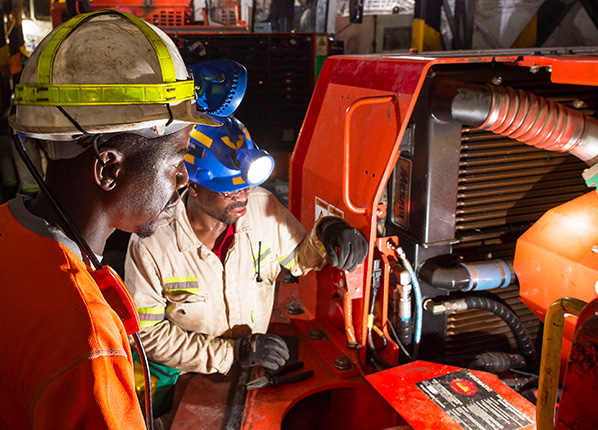Contract mining appears to be an emerging model in the industry. When companies need help with recruitment services, one of the first things the recruiting agencies ask is whether the position is a contract labor or direct placement opportunity. This is because a direct-hire vs. contract labor position will determine the type of recruiting and screening they do as well as how that employee will be managed during their tenure.
DIRECT-HIRE IS FOR LONGER-TERM, IN-HOUSE EMPLOYEES
Direct-hire refers to the process of hiring an employee to work for a company on a permanent or long-term basis. In the mining and geology industry, direct-hire employees are typically hired for technical and professional roles such as geologists, engineers, and project managers.
Many mining, exploration, or geology outfits require direct hires for higher-level expert needs, such as senior geologists, team leads, and engineers, as well as business-oriented positions such as finance professionals, executive team members, or specialists in safety, logistics, analytics, and more. Since these hires are in-house, their employment, salary, and benefits are managed and paid directly through the company as opposed to through the hiring agency.
In this case, the hiring agency works as an expert recruiter and brings the benefit of having a deep pool of candidates as well as high-quality hiring processes to improve the number and quality of candidates. It also greatly reduces or eliminates the need for in-house recruiting, and screening efforts. This helps to ensure a top-quality fit without detracting time and attention from your company’s everyday operations for recruiting activities.
Direct-hire employees are often provided with benefits such as healthcare, retirement plans, and vacation time. They are also usually entitled to job security and have the opportunity for career growth within the company.
In general, direct hire services can typically offer a better candidate in less time and with significantly less in-house effort and often at a reduced expense than in-house recruitment.
CONTRACT LABOUR FILLS SHORT-TERM SEASONAL OR TEMPORARY NEEDS
Contract labor is typically for shorter-term on-site work, such as field crew, warehouse and materials positions, junior geologists, geotechnicians, and more. Instead of these experts being long-term, in-house hires, the specifics of the hire are typically left to the hiring agency—in this case, Rangefront—who simplifies the contract process for the client by providing benefits, managing salary and HR, providing training and conflict resolution, and beyond for the contract hire.
In the mining and geology industry, contract labor is often used for tasks such as exploration, drilling, and production. Contract workers are typically hired through staffing agencies or independent contractors and are not provided with the same benefits and job security as direct-hire employees. However, contract workers are often paid higher hourly rates and have more flexibility in their work schedules.
While direct-hire employees in mining and geology are typically hired for permanent or long-term technical and professional roles, contract labor is used for temporary or short-term tasks such as exploration, drilling, and production. Direct-hire employees enjoy benefits and job security, while contract workers are paid higher hourly rates and have more flexibility in their work schedules.
HOW DOES THE DIRECT-HIRE PROCESS WORK?
Each direct hire services company is different, but at Rangefront, our direct hire process generally includes the following steps:
-
Discuss your needs for the position. This is where we discuss the specific job duties, requirements, and preferences you have for the position you are hiring for. If you’re not sure whether to go with a contract or direct hire, our experts will discuss your options with you during this stage. We can also help fill in gaps for duties, experience, or regulations.
-
Recruiting operations. After your needs are detailed, the Rangefront experts take it from there. We use a combination of existing network tapping and recruitment operations to choose a small pool of top-quality candidates. We’ll search our existing base of experts as well as bring in fresh candidates to narrow down the best possible candidates.
-
Interview processes. We take person-to-person interviews very seriously at Rangefront, and our interviewers are excellent at what they do. We know that resumes and prior experience are important, but we also never discount that multiple conversations with an individual can tell you much more about how an individual will fit into the position, expert needs, company culture, and long-term expectations of the position.
-
Candidates or a single hire. Would you like us to narrow our choices down to the top 3 candidates? Pick the best hire for the position? Or provide you a set number of resumes so you can conduct interviews with your internal team? Our processes are directly tied to your end goal, and we can provide as many candidates as you’d like—or we can have the final hire ready for the final job offer and start date.
-
Right-fit follow-up. After the candidate is placed, we will perform a select number of follow-ups to ensure the candidate is the right fit. On the off chance there is a difference that can’t be resolved, Rangefront can help to place a new hire in a timely and effective manner.
Now you know.
Ref. Rangefront

